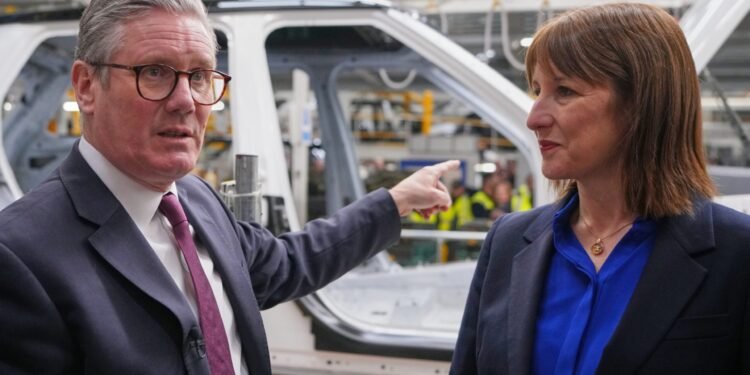UK prime minister Keir Starmer has loosened climate targets in response to a raft of new import tariffs unveiled by US president Donald Trump.
The office of 10 Downing Street said the government still plans to phase out new petrol and diesel car sales from 2030, but those rules will be relaxed.
Hybrid cars will be allowed to be sold until 2035 under the revised rules, while small manufacturers and super car brands will now be exempt.
The prime minister’s office said Starmer would be “easing pressure on industry” through a £2.3 billion investment in manufacturing zero-emissions vehicles.
“Global trade is being transformed so we must go further and faster in reshaping our economy and our country through our plan for change,” said Starmer.
“I am determined to back British brilliance. Now more than ever UK businesses and working people need a government that steps up, not stands aside.”
He said the package of measures “will help ensure home-grown firms can export British cars built by British workers around the world”.
UK business secretary Jonathan Reynolds described the latest package of measures as providing the “bold action” needed to enable job security and drive investment in the country’s automotive sector.
The move to shore up the UK’s car industry comes as stocks plunged following the announcement of the new US import tariffs, sending the FTSE100 premium index spiralling to the lowest point in a year.
Among those trade charges was a 10% reciprocal tariff on UK-manufactured goods and a 25% levy on imported cars and parts.
The Energy Industries Council (EIC) said Trump’s 10% export tariff on imports from the UK is expected to ‘turn’ energy companies away from doing business in the States.
Starmer said the latest import tariffs have ushered in a “new era”, which he said means government must go “further and faster” on its Plan for Change.
He wrote separately in an opinion piece published in the Telegraph: “The world as we knew it has gone. Nobody wins from a trade war.”
The PM’s office said that British car brands like Rolls-Royce, Vauxhall and Land Rover will be given support as part of its plan to back industry in the face of global economic headwinds.
Small and micro-volume manufacturers will be excluded from the new package of measures, while supercar brands such as Aston Martin and McLaren will also be ringfenced to preserve “iconic jewels” of the car industry, the government said.
According to the Department for Energy Security and Net Zero, the UK was the largest market for electric vehicles in Europe in 2024.
Last year, UK-based manufacturers sold 382,000 electric vehicles, a fifth more than the previous year.
The UK automotive industry employs 152,000 people and adds approximately £19bn to the country’s economy.
Demand for electric vehicles is rising, with the latest data showing that sales in March were up over 40% on last year.
Transport secretary Heidi Alexander said: “There is a huge opportunity to be harnessed here – with the UK being the largest EV market in Europe.
“Over £6bn of private funding is lined up to be invested in the UK’s chargepoint roll-out by 2030. Since July, the government has also seen £34.8bn of private investment announced into UK’s clean energy industries.”
The PM’s office said the package will be backed by a forthcoming modern industrial strategy, due to be published this spring.
The changes will involve adjusting the zero-emission vehicle mandate to make it easier for industry to upgrade and make electric vehicles.
Those measures include increasing flexibility of the mandate for manufacturers up to 2030, so that more cars can be sold in later years when demand is higher.
This will allow hybrid cars, such as the Toyota Prius and Nissan e-Power, to be sold until 2035 to help ease the transition to non-petrol cars.
Vans with an internal combustion engine, as well as full hybrids and plug-in hybrid vans, will continue to be sold until 2035.
The updated zero emissions vehicle mandate will also extend the ability to transfer non-zero emissions vehicles under the scheme to zero emissions vehicles from 2026 to 2029. The ability to borrow will be extended to 2029, with repayment enabled until 2030.
Labour has also pledged to boost spending on UK manufacturing and improving charging infrastructure, with a goal to add a new chargepoint to the country’s infrastructure every half an hour.
There are now more than 75,000 public plug-in electric vehicle chargepoints across the UK.
London-based charge-point supplier char.gy said on Monday that it is poised to deliver the UK’s largest ever street charging project in partnership with Brighton and Hove City Council.
Government said it is also preparing to put in place hundreds of millions of pounds of tax breaks to help people switch to electric vehicles as part of the package of measures, made following a consultation.
It also plans to review support for the car industry and the impact of the new tariffs.










